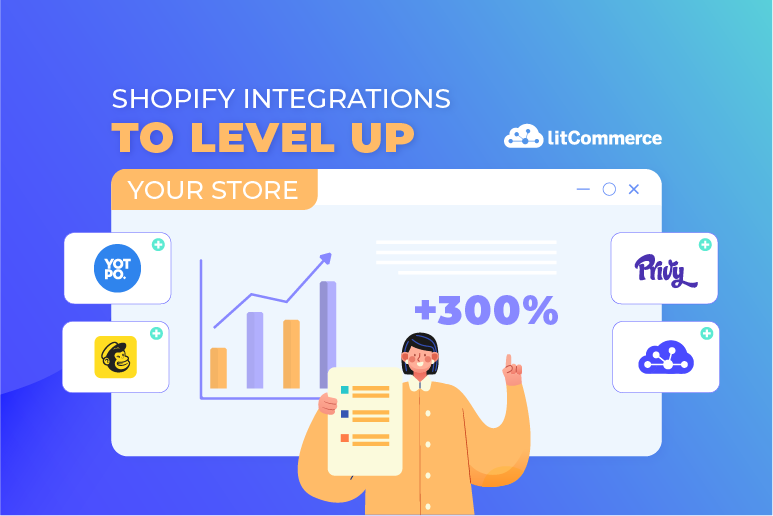Shopify – one of the best eCommerce platforms – helps sellers quickly set up an online store. Unfortunately, if you don’t make use of Shopify integrations, you’re missing out on a lot of opportunities.
Shopify’s default experience is intended to be straightforward. At any pricing plan, you will get an online store, unlimited product listings, inventory tracking, shipping, an SSL certificate, and customer support options. Besides, Shopify is also preferable for big sellers and those who want to run a B2B business with the Shopify Plus plan. On top of that, Shopify is a modular platform that allows you to add as much functionality as you want through both first- and third-party apps.
We’ll walk you through the Shopify integrations that can help you transform your store, increase sales, and improve your marketing across several channels.
Let’s get the ball rolling!
Don’t miss out on our latest updates on Shopify reviews and the comparison of Shopify vs Shopify Plus. Check them out now!
What Kinds of Shopify Integrations Should be Used?
Shopify allows store owners to integrate their stores with more than 8,000 apps on Shopify App Store to support the operation and development. Therefore, the inventors also provide different kinds of apps to optimize Shopify stores, from marketing support and conversions; to SEO optimization; offering deals, gifts, and free shipping; MailChimp integration to managing sales on multiple channels; from free apps to paid apps.
In addition, according to research by GoodFirms, 41.2% of store owners use 1 to 5 integration apps; 35.3% use 6 to 10 integration apps; 19.6% use 11 to 15 integration apps; 3.9% use 16 to 20 integration apps; and do not record who use more than 20 integration apps.
Therefore, it can be seen that store owners are very interested and focused on using Shopify integrations when selling on Shopify, especially apps related to Marketing support. Adding to that, when you use Shopify Plus, you definitely need to take advantage of Shopify integrations as well as Shopify apps.
Top Shopify Integrations Apps to Optimize Your Store
Running a successful Shopify store takes more than great products: it’s about connecting the right tools that streamline operations, improve customer experience, and boost sales. Shopify’s app ecosystem offers hundreds of integrations designed to help you manage every part of your business efficiently. From marketing automation and product sourcing to shipping and customer support, these apps can transform how your store performs.
We’ve rounded up the top Shopify integration apps that every merchant should consider. Whether you’re looking to increase conversions, simplify workflows, or expand your selling channels, these tools will help you optimize your store and scale with confidence.
Sales channels apps
1. Pinterest for Shopify
Pinterest for Shopify connects your online store directly to your Pinterest business account, allowing your product catalog to appear as Product Pins. These pins are automatically updated and can be promoted through Pinterest Ads. It helps your products reach a wider audience of shoppers who use Pinterest for inspiration and product discovery.
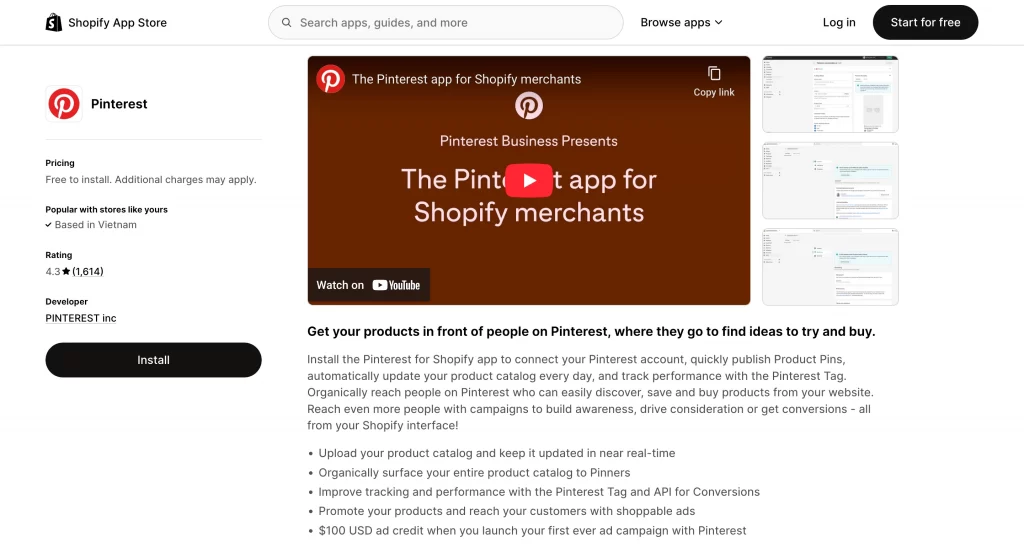
Features
- Automatically uploads and syncs your product catalog to Pinterest.
- Installs the Pinterest Tag and Conversion API to track performance and conversions.
- Enables shoppable ad campaigns managed from within Shopify.
- Expands reach to Pinterest’s visual discovery audience.
Pros:
- Easy to install and integrates smoothly with Shopify.
- Keeps listings up to date through real-time syncing.
- Provides exposure to Pinterest’s large user base.
- Offers ad credits for new advertisers to get started.
Cons:
- Although free to install, ad campaigns incur costs.
- Best suited for visually appealing product categories.
- Requires a Pinterest business account and setup of analytics tools.
Pricing: Free to install. You only pay for Pinterest ad campaigns you choose to run.
2. LC Custom XML Feeds, CSV Feeds (by LitCommerce)
LC Custom XML Feeds, CSV Feeds allows Shopify merchants to create and manage custom product data feeds in multiple formats (XML, CSV, TXT). These feeds can be used to connect with marketplaces, affiliate networks, and advertising channels like Google Shopping, Meta, TikTok, and more.
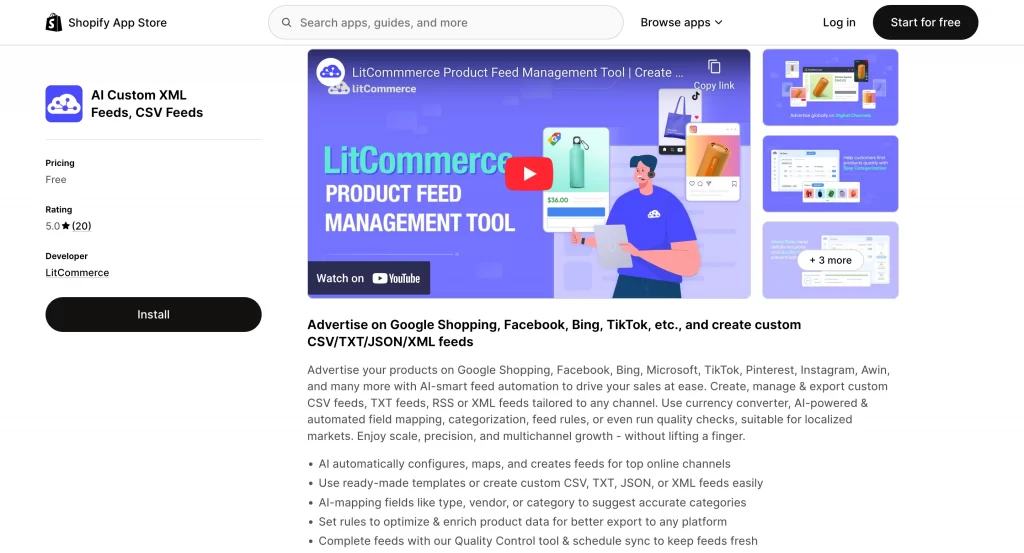
Features
- Create fully customized data feeds for different sales and marketing platforms.
- Use templates or build feeds from scratch with intuitive mapping tools.
- Automate feed updates through scheduling and rules.
- Supports multiple languages, currencies, and product variants.
Pros:
- Extremely flexible for merchants with complex multichannel needs.
- No coding required, making it accessible for beginners.
- Great automation options for updating and maintaining feeds.
Cons:
- May be more advanced than necessary for smaller stores.
- Requires accurate product data to achieve best results.
- Setup involves some time for mapping and optimization.
Pricing: Free to install. Advanced usage or larger feeds may require paid plans.
3. Swym Wishlist Plus
Swym Wishlist Plus adds wishlist functionality to your Shopify store, allowing customers to save items for later even without creating an account. It helps drive engagement, repeat visits, and higher conversion rates through saved products and personalized notifications.
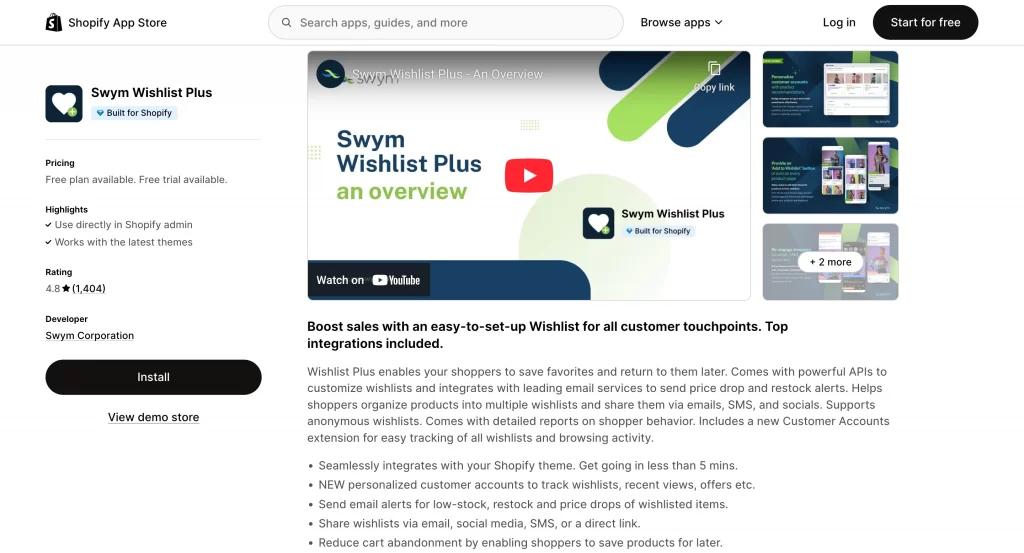
Features
- Lets users create multiple or guest wishlists.
- Enables sharing of wishlists via email, SMS, or social media.
- Sends alerts for price drops, restocks, or low inventory.
- Offers analytics to track wishlist performance and customer intent.
Pros:
- Encourages engagement and repeat visits.
- Reduces cart abandonment by letting shoppers save products.
- Provides valuable behavioral data for marketing and retargeting.
Cons:
- Benefits are incremental and depend on marketing follow-up.
- Requires design customization to fit your theme.
- Can be costly for small stores with limited product ranges.
Pricing
- Free plan available (limited wishlist actions).
- Paid plans range from $19.99/month to $99.99/month, depending on features and usage.
4. Shopify Collective: Supplier
Shopify Collective: Supplier allows you to share your products with other Shopify merchants who can list and sell them on their stores. You handle fulfillment, and Shopify automatically syncs inventory, manages orders, and processes payments. It’s a powerful way to expand distribution through other retailers.
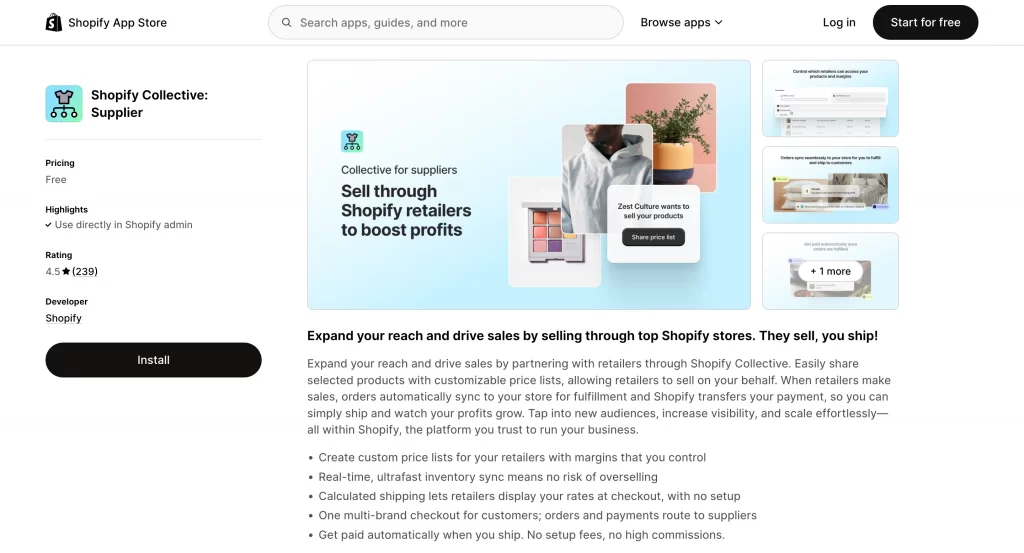
Features
- Share price lists and products with approved retail partners.
- Real-time inventory and pricing synchronization.
- Orders from retail partners appear in your Shopify admin for fulfillment.
- Ability to participate as a supplier, retailer, or both.
Pros:
- Expands product reach through other Shopify retailers.
- Reduces marketing costs while increasing distribution.
- Fully integrated within Shopify, ensuring reliability and ease of use.
Cons:
- Requires eligibility (Shopify Payments and specific regional availability).
- You remain responsible for fulfillment and returns.
- Managing retailer partnerships can require coordination and oversight.
Pricing: Free to use for eligible stores. No setup fees or commissions are charged.
Selling products apps
1. Infinite Product Options
Infinite Product Options is a Shopify app that allows merchants to add unlimited customization fields and variants to their product pages. It’s ideal for stores offering personalized or configurable items — such as apparel with custom text, engraved jewelry, or products that require customer input before checkout.
By going beyond Shopify’s built-in 100-variant limit, the app gives full flexibility to create unique product experiences that enhance customer engagement and improve upselling opportunities.
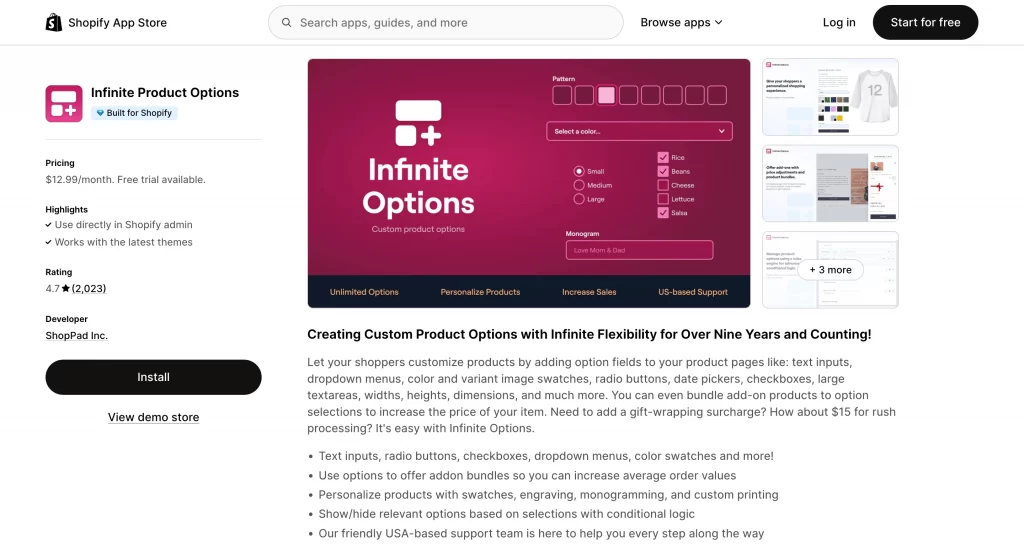
Features
- Add unlimited product options including text boxes, dropdowns, radio buttons, checkboxes, swatches, file uploads, and date pickers.
- Use conditional logic to show or hide options based on customer selections.
- Offer add-on pricing, allowing certain customizations to increase product cost automatically.
- Apply custom option sets to specific products, collections, or the entire store.
- Compatible with all Shopify themes and optimized for both desktop and mobile devices.
Pros
- Eliminates Shopify’s variant limit and enables full product customization.
- Easy drag-and-drop interface for building complex option sets.
- Helps increase average order value through add-on pricing.
- Excellent for businesses offering personalization or made-to-order products.
- Great customer support and regular feature updates.
Cons
- May require minor styling adjustments to match certain themes.
- Overly complex setups might slow down the product page slightly.
- Custom option data must be managed carefully to avoid fulfillment errors.
Pricing
- Free plan available with basic option types.
- Paid plans start around $9.99/month, offering unlimited options, conditional logic, and add-on pricing.
- 14-day free trial available for new users.
2. GLO Color Swatch & Bundles
GLO Color Swatch & Bundles helps merchants improve product presentation and boost sales by adding visual variant selectors and customizable bundle options. Customers can easily view product colors, images, and variations while taking advantage of bundle or quantity-based discounts.
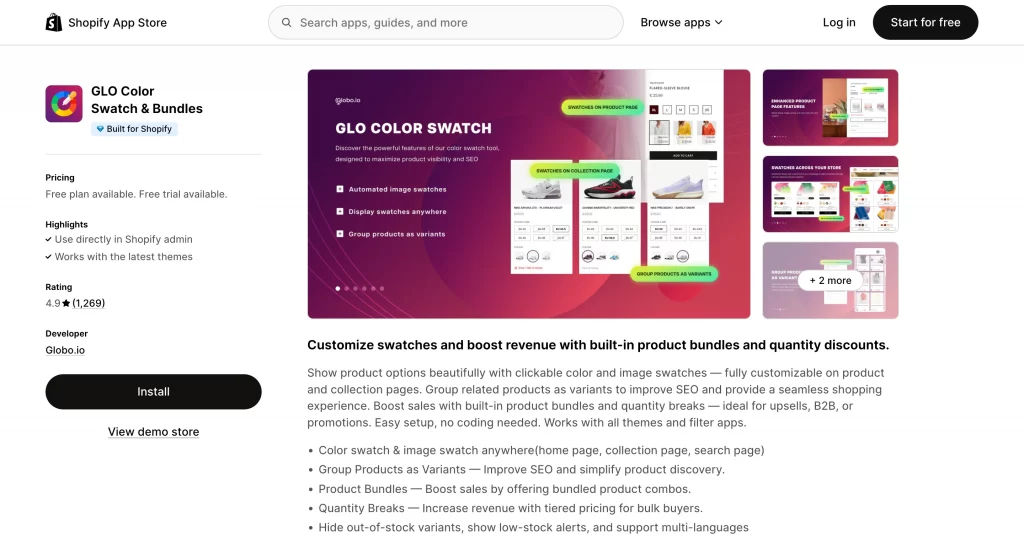
Features
- Display product variants as color, image, or text swatches.
- Create product bundles, combo deals, and quantity discounts.
- Sync variant images and prices dynamically in real time.
- Compatible with most Shopify themes and requires no coding.
Pros:
- Makes products more visually engaging and easier to browse.
- Encourages upselling through bundles and multi-buy discounts.
- Intuitive interface and strong customer support.
- Multi-language support for international stores.
Cons:
- Stores with simple product lines may not need all features.
- Bundling logic may require regular monitoring to avoid errors.
- Minor adjustments might be needed for heavily customized themes.
Pricing
- Free plan with essential features.
- Paid plans start at about $9.90/month, with advanced options and unlimited bundles available at higher tiers.
3. Easify Custom Product Options
Easify Custom Product Options allows merchants to add unlimited customization options to their products. It’s ideal for businesses offering personalized items such as engraved jewelry, printed apparel, or custom packaging. Customers can enter text, upload files, or choose from dropdowns and color pickers when purchasing.
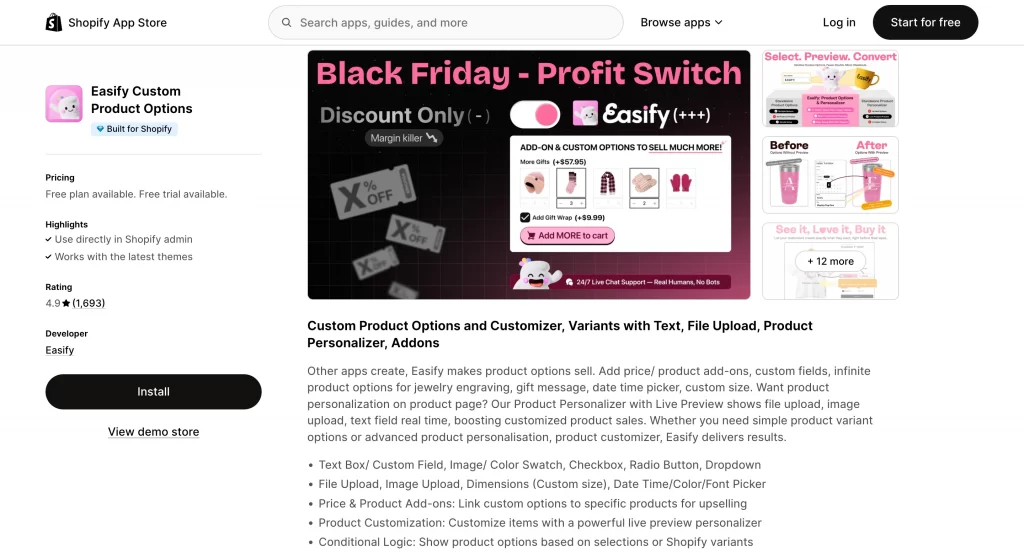
Features
- Over 15 option types, including text fields, dropdowns, file uploads, and image uploads.
- Conditional logic to show or hide options based on customer selections.
- Live preview to display customization results in real time.
- Supports multilingual stores and exports order data with custom details.
Pros:
- Highly flexible and supports extensive customization scenarios.
- Enhances customer experience and allows upselling with personalization.
- Simple drag-and-drop setup for non-technical users.
- Well-rated for performance and ease of use.
Cons:
- May require theme adjustments for complex custom setups.
- Adds complexity to order fulfillment for customized products.
- Overkill for stores selling standard, non-customized items.
Pricing
- Free plan includes core customization options.
- Pro plan starts around $9.99/month, and Premium plan around $19.99/month with full features such as live previews and advanced logic.
4. Appstle℠ Subscriptions App
Appstle Subscriptions is a comprehensive tool for setting up and managing product subscriptions on Shopify. It enables recurring billing, automated deliveries, and subscriber management — perfect for stores offering subscription boxes, memberships, or recurring replenishment products.
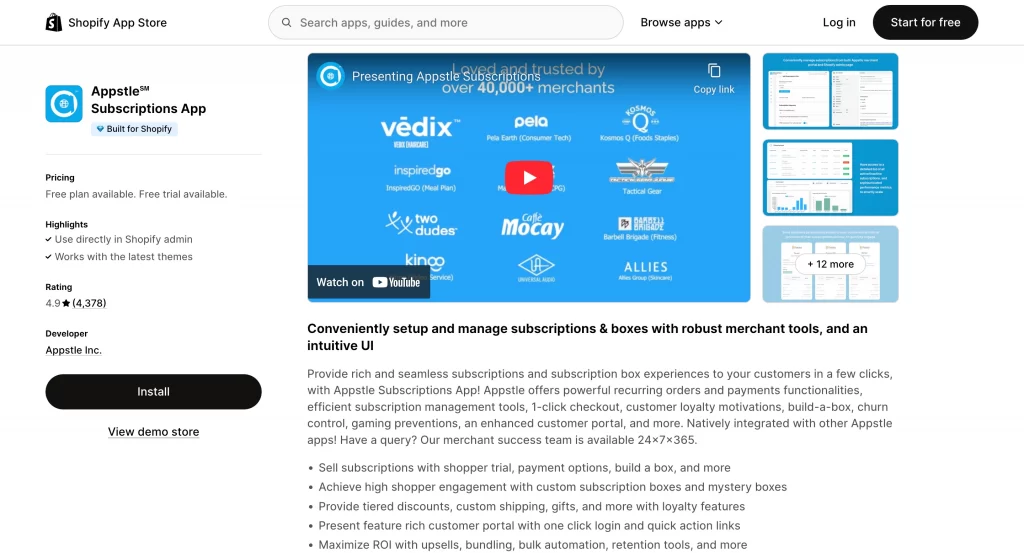
Features
- Create and manage recurring subscription plans for products.
- Offer flexible billing models: weekly, monthly, prepaid, or trial-based.
- Allow customers to manage their subscriptions via a self-service portal.
- Track performance with detailed analytics and churn reports.
- Supports subscription bundles, loyalty programs, and discount tiers.
Pros:
- Great for building predictable recurring revenue.
- Very strong feature set and merchant reviews.
- Easy to implement with flexible subscription options.
- Free plan makes it accessible for startups and small businesses.
Cons:
- Requires setup time to align subscriptions with fulfillment and logistics.
- Not ideal for stores that sell only one-time purchases.
- Some advanced features may need theme adjustments.
Pricing
- Free plan available for stores with limited subscription revenue.
- Paid tiers typically range from $10 to $100/month depending on revenue, features, and support level.
Store design apps
1. Yotpo: Product Reviews App
Yotpo Product Reviews helps Shopify merchants collect, display, and manage product reviews, ratings, and customer photos. It builds social proof that drives trust and conversions, while offering automated tools to gather reviews through post-purchase emails and customizable widgets.
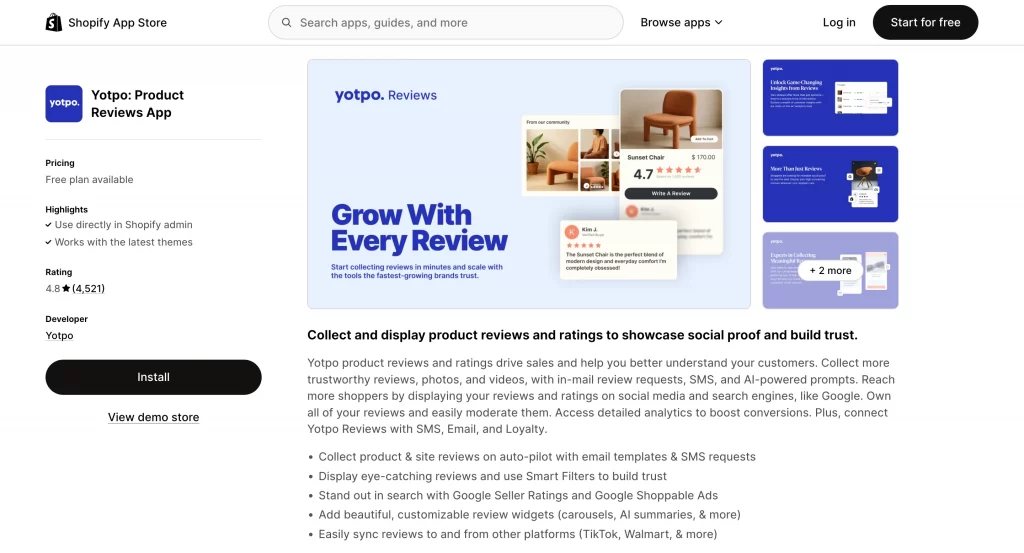
Features
- Automatically collect product reviews via email and SMS requests.
- Display ratings, photos, and Q&A sections using customizable widgets.
- Integrate reviews across social media and Google Shopping.
- Offers moderation tools and AI-based sentiment analysis.
- Supports review imports from other platforms for easy migration.
Pros:
- Strong automation and moderation tools.
- Increases buyer trust through authentic user-generated content.
- Integrates seamlessly with Shopify and major marketing apps.
- Boosts SEO with rich snippets and review schema.
Cons:
- Free plan has limited customization options.
- Advanced analytics and visual widgets require paid plans.
- May take some time to set up design layouts to match your store’s branding.
Pricing
- Free plan includes basic review collection and display.
- Paid plans start around $15/month, scaling up based on features such as photo reviews, video reviews, and advanced integrations.
2. Tiny SEO Speed Image Optimizer
Tiny SEO Speed Image Optimizer is an all-in-one tool to enhance your store’s performance by optimizing images, improving loading speed, and strengthening on-page SEO. Faster page speed not only improves user experience but also helps boost Google rankings and conversion rates.
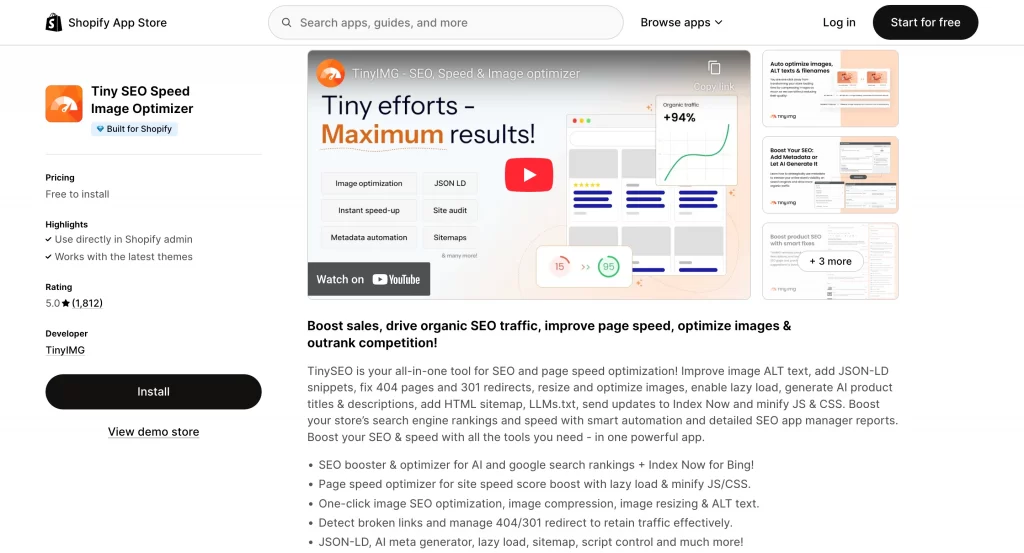
Features
- Compresses images without quality loss to improve load speed.
- Automatically adds and fixes alt text for SEO.
- Scans and optimizes meta tags, titles, and broken links.
- Monitors overall site performance with automated reports.
- Works in the background to optimize newly uploaded images automatically.
Pros:
- Immediate impact on site speed and SEO performance.
- Fully automated optimization saves time.
- Simple setup and minimal ongoing maintenance.
- Improves conversion rates by reducing bounce rates.
Cons:
- Benefits are mostly technical — limited visual impact.
- Optimization results depend on your theme and hosting quality.
- Advanced SEO features may require upgrading.
Pricing
- Free plan includes basic optimization tools.
- Paid plans typically start around $9.99/month, depending on the number of images and advanced SEO options.
3. PageFly Landing Page Builder
PageFly is one of the most popular landing page builders for Shopify, designed to help merchants create high-converting product pages, homepages, and sales funnels without coding. It offers drag-and-drop functionality with full customization to reflect your brand’s identity.
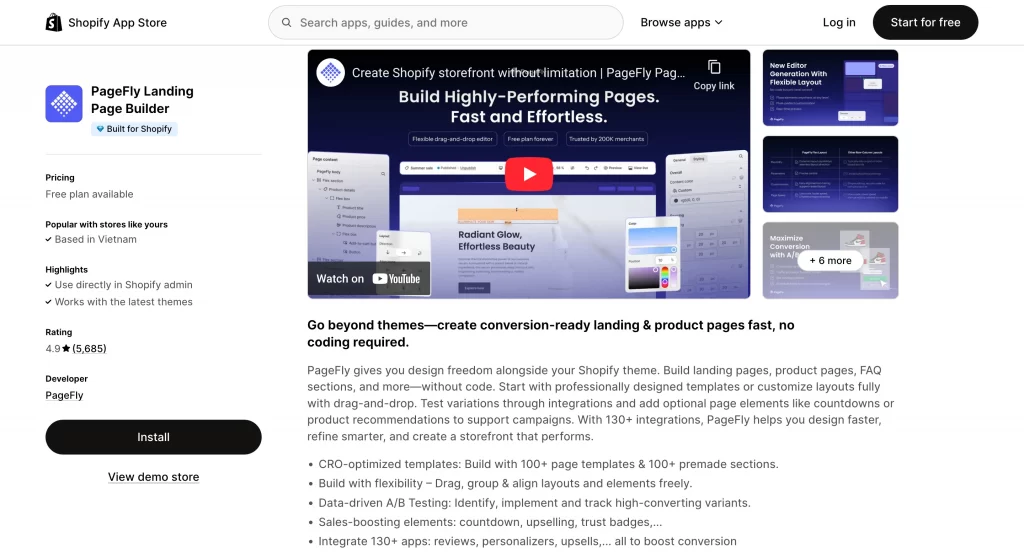
Features
- Drag-and-drop editor for building product, collection, and landing pages.
- Mobile-responsive layouts and custom templates.
- Integrates with Shopify apps like Klaviyo, Judge.me, and Google Analytics.
- Advanced elements such as countdown timers, videos, and add-to-cart buttons.
- Built-in performance optimization for page speed.
Pros:
- No coding skills required, making it accessible for all users.
- Highly flexible with professional-grade design control.
- Excellent support and template library for inspiration.
- Helps increase conversion rates through optimized layouts.
Cons:
- The editor can feel complex for first-time users.
- Too many design options may overwhelm beginners.
- Adding multiple custom pages may slightly affect store speed.
Pricing
- Free plan includes one publishable page and access to core features.
- Paid plans start around $24/month, with more publishable pages and advanced design elements at higher tiers.
4. Omnisend Email Marketing & SMS
Omnisend is an advanced email and SMS marketing app built to help Shopify merchants automate communication, nurture customer relationships, and drive repeat purchases. It provides pre-built workflows, powerful segmentation, and omnichannel messaging in one dashboard.
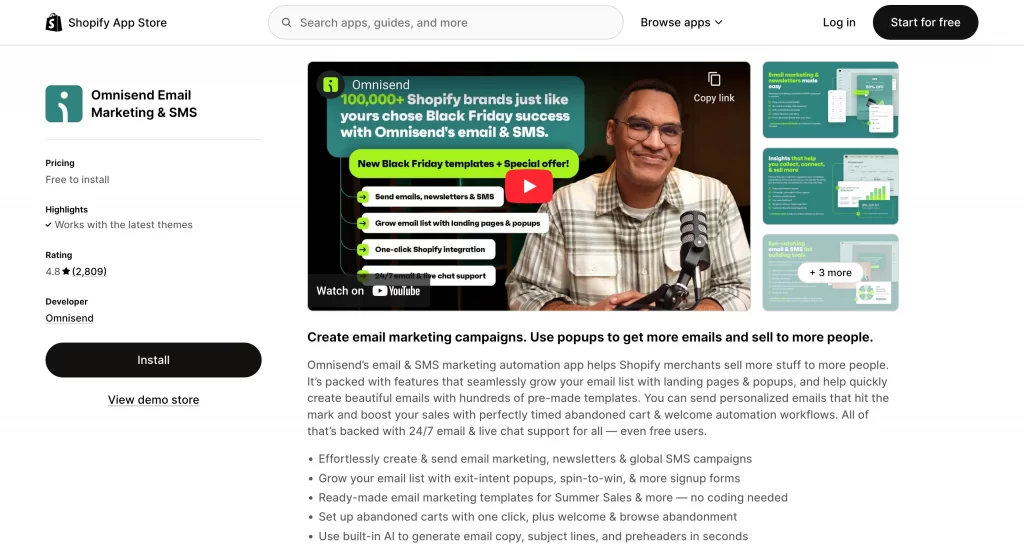
Features
- Email and SMS automation workflows for welcome, cart recovery, and post-purchase campaigns.
- Drag-and-drop email builder with branded templates.
- Advanced segmentation and targeting based on customer behavior.
- Integration with Shopify’s customers and order data for real-time syncing.
- A/B testing, analytics, and automation reports for optimization.
Pros:
- Combines email, SMS, and push notifications in one platform.
- User-friendly with templates and prebuilt automation flows.
- Scales well for growing merchants with large contact lists.
- Excellent customer support and onboarding resources.
Cons:
- SMS costs are billed separately and can add up.
- Advanced reporting and automation are only available on paid plans.
- May feel overpowered for stores with very small customer bases.
Pricing
- Free plan available with up to 250 contacts and 500 monthly emails.
- Paid plans start around $16/month and scale with contact list size and feature depth.
Store management app
1. Lucky Orange Heatmaps & Replay
Lucky Orange helps Shopify merchants understand customer behavior through heatmaps, session replays, and analytics. It allows you to see exactly how visitors interact with your store — where they click, scroll, and drop off — so you can identify usability issues and improve conversions.
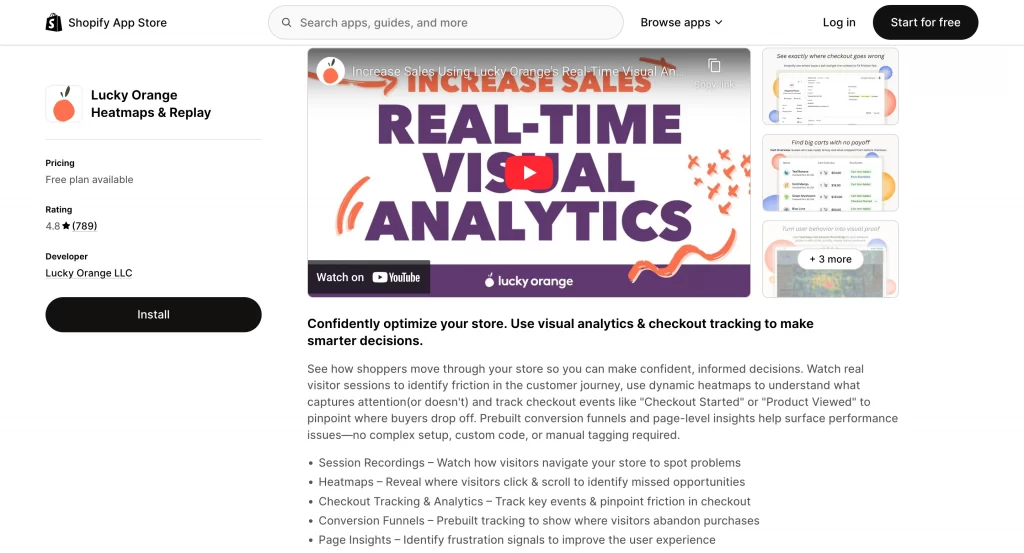
Features
- Session recording and replay to watch real customer journeys.
- Dynamic heatmaps that visualize clicks, scrolls, and engagement zones.
- Real-time visitor tracking with filters for device, traffic source, and location.
- Built-in surveys, live chat, and form analytics to collect feedback.
- Conversion funnels to pinpoint where customers abandon the checkout process.
Pros:
- Provides deep visual insights into customer behavior.
- Helps identify UX or checkout issues that hurt conversion rates.
- Integrates directly with Shopify for smooth data tracking.
- Offers both quantitative and qualitative analytics.
Cons:
- Video recordings can be time-consuming to review.
- May require practice to interpret data effectively.
- Can slightly impact site performance if many tracking elements are active.
Pricing
- Free plan available with limited sessions and features.
- Paid plans typically start around $18/month, scaling based on traffic volume and data retention needs.
2. Gorgias: Helpdesk, Chat & FAQ
Gorgias is a customer service and helpdesk platform built for eCommerce. It centralizes all customer support messages — including email, live chat, social media, and SMS — into a single dashboard, making it easier for Shopify merchants to manage communication and respond faster.
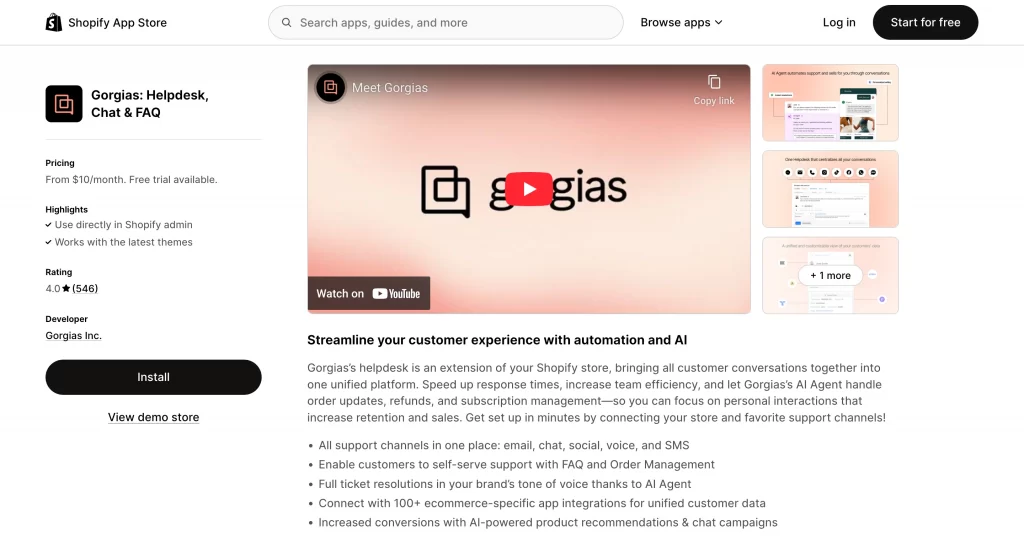
Features
- Unified inbox for email, chat, Facebook, Instagram, and WhatsApp messages.
- AI-powered macros and automation for faster replies.
- Direct Shopify integration to view customer orders and issue refunds from within Gorgias.
- Self-service options including FAQ widgets and automated replies.
- Team performance tracking and analytics to measure response times and satisfaction.
Pros:
- Greatly improves efficiency by centralizing all communication channels.
- Deep Shopify integration allows you to manage customer data without switching tabs.
- Strong automation and AI tools save time for support teams.
- Scalable for small to enterprise-level businesses.
Cons:
- Can be complex to set up for beginners.
- Pricing grows as ticket volume increases.
- Some advanced automation tools are available only on higher plans.
Pricing
- Free trial available.
- Paid plans start around $10 per month (Starter) and scale up based on ticket volume and team size. Enterprise plans are also available for high-volume merchants.
3. Shopify Flow
Shopify Flow is Shopify’s native automation tool designed to help merchants streamline store operations without coding. It automates repetitive tasks such as tagging customers, updating inventory, or sending alerts based on triggers and conditions.
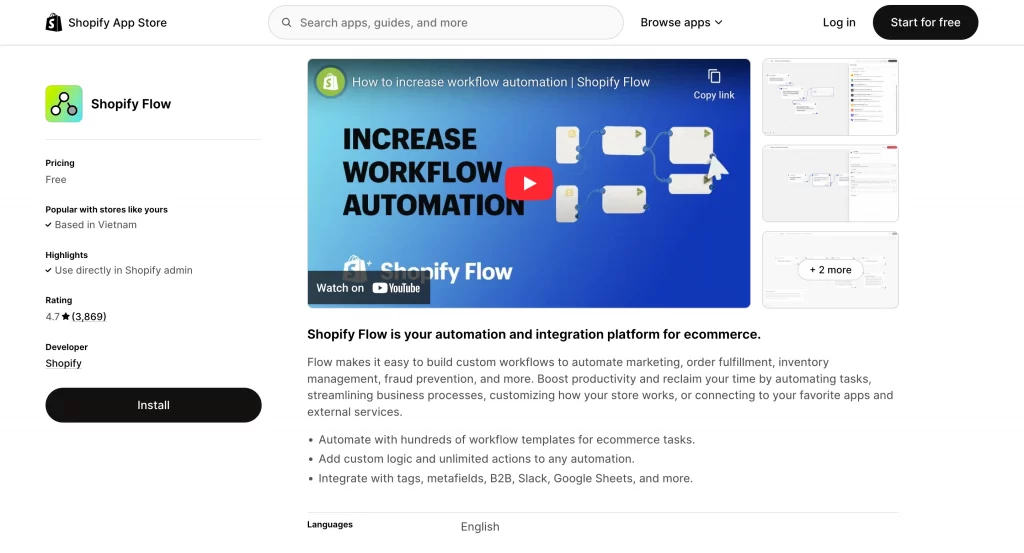
Features
- Create custom automation workflows using triggers, conditions, and actions.
- Automate inventory updates, order tagging, fraud checks, and customer segmentation.
- Integrates with apps like Klaviyo, Gorgias, and LoyaltyLion for cross-platform automation.
- Visual workflow builder with prebuilt templates for common use cases.
- Runs seamlessly in the background with no performance impact.
Pros:
- Completely native to Shopify, ensuring smooth compatibility.
- Saves hours of manual work through hands-free automation.
- Easy to use with a drag-and-drop workflow builder.
- Highly scalable for growing stores.
Cons:
- Available only for Shopify, Shopify Plus, and Advanced plan merchants.
- Requires basic understanding of triggers and logic flows.
- Some integrations still need manual setup.
Pricing: Free for eligible Shopify merchants (included in Shopify, Advanced, and Plus plans).
4. Tidio – Live Chat & AI Chatbot
Tidio is a live chat and AI chatbot platform designed to help Shopify stores improve customer engagement, answer questions instantly, and convert visitors into buyers. It combines human chat support with intelligent automation for round-the-clock customer service.
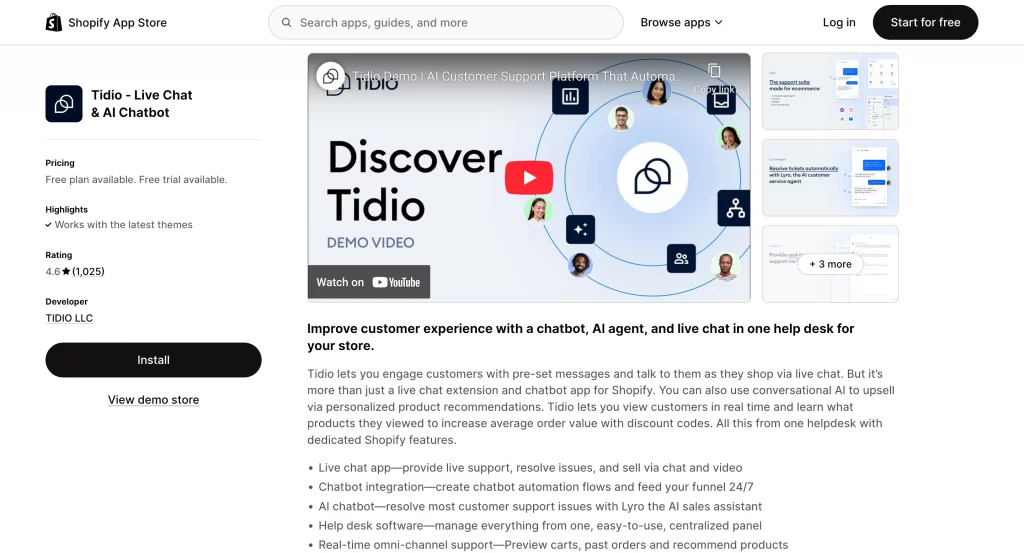
Features
- Live chat widget with real-time visitor monitoring.
- AI chatbots that answer common questions, recommend products, and recover abandoned carts.
- Multichannel support via email, Messenger, and Instagram integration.
- Mobile app for chat management on the go.
- Analytics dashboard for message volume, response time, and sales tracking.
Pros:
- Combines live support and automation in one easy interface.
- Boosts sales by engaging shoppers at critical decision points.
- Customizable chatbot flows for personalized experiences.
- Integrates directly with Shopify and most email marketing tools.
Cons:
- Free plan has limited chatbot interactions.
- Complex automation scenarios may require a learning curve.
- Chat widget can slow down site performance if heavily customized.
Pricing
- Free plan includes basic live chat and limited chatbot conversations.
- Paid plans start around $29/month, with premium tiers for higher message limits and advanced AI capabilities.
Sourcing apps
1. Faire: Buy Wholesale
Faire is a wholesale marketplace app that connects Shopify retailers with thousands of independent brands and suppliers worldwide. It allows merchants to source high-quality wholesale products with low minimums, flexible payment terms, and direct supplier relationships, all integrated into their Shopify store.
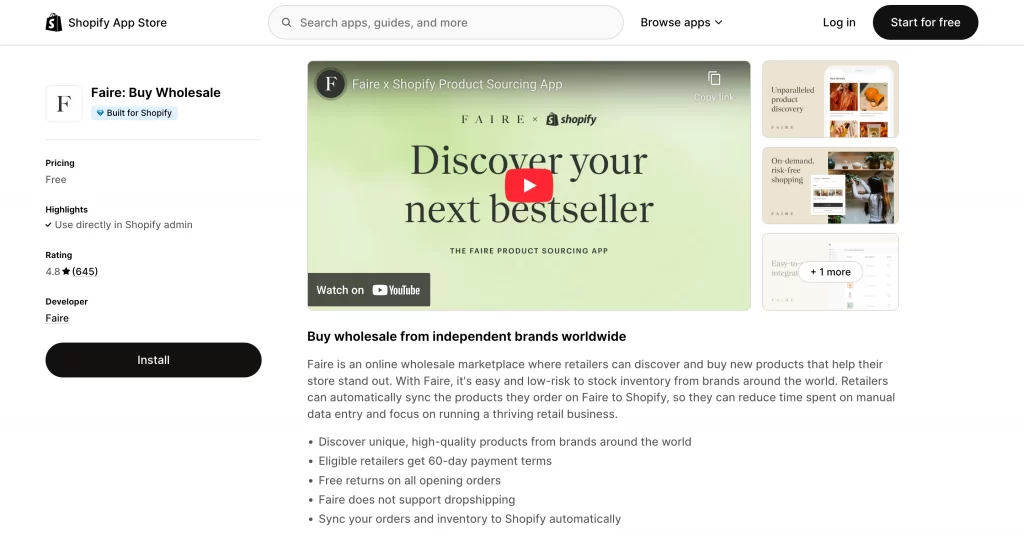
Features
- Access to a large catalog of wholesale products across multiple categories.
- Net 60 payment terms and free returns on first orders with new suppliers.
- Direct integration to import selected products to your Shopify store.
- Personalized recommendations based on your store’s niche and order history.
- Built-in order management and communication with suppliers.
Pros
- Gives retailers easy access to global brands without attending trade shows.
- Low order minimums make it ideal for small to medium stores.
- Smooth Shopify integration for importing and managing wholesale products.
- Transparent supplier communication and payment options.
Cons
- Wholesale pricing means smaller margins compared to direct manufacturing.
- Some products or suppliers may not ship globally.
- Not suitable for merchants looking to sell their own branded products.
Pricing: Free to install and use. Retailers pay only for wholesale product orders placed through Faire.
2. Gelato: Print on Demand
Gelato is a global print-on-demand platform that connects Shopify stores with local printing partners in over 30 countries. It enables merchants to sell custom products, such as T-shirts, mugs, posters, and phone cases, which are automatically printed and shipped to customers worldwide.
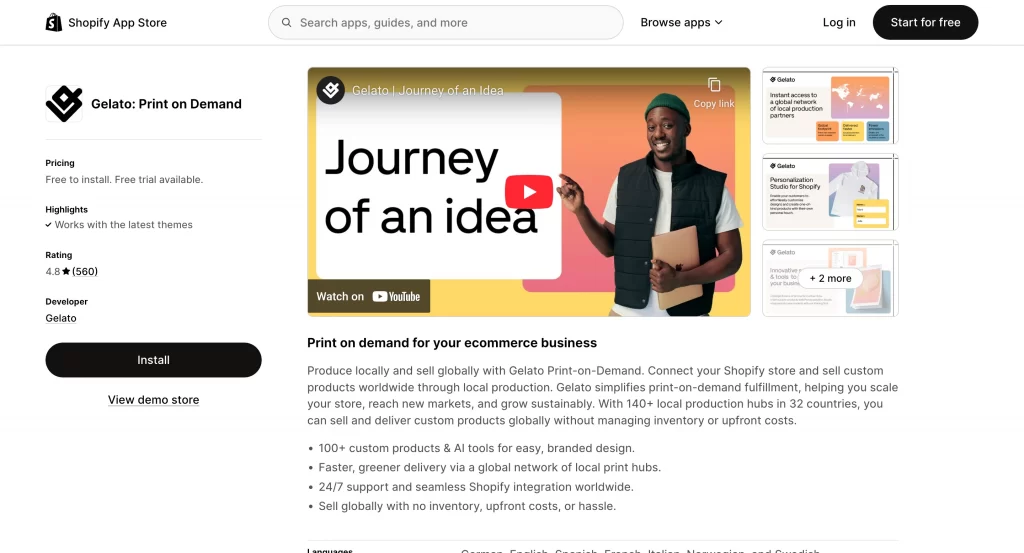
Features
- Offers 200+ customizable products including apparel, wall art, stationery, and gifts.
- Local printing in 30+ countries for faster and more sustainable delivery.
- Automated order routing, printing, and shipping once a customer places an order.
- Design tools to upload or sync artwork and create branded products.
- White-label fulfillment with no Gelato branding on packaging.
Pros:
- Global printing network reduces shipping times and costs.
- No upfront inventory: products are printed only after purchase.
- High product quality and eco-conscious production.
- Seamless Shopify integration with real-time order sync.
Cons
- Product base prices may be higher than in-house production.
- Limited customization on certain products compared to specialized POD platforms.
- Branding options (like custom packaging) may require paid upgrades.
Pricing
- Free to install and use. You only pay for products ordered and shipped.
- Optional “Gelato+” subscription (~$14.99/month) unlocks premium tools, discounts, and branding options.
3. AutoDS: AI Dropshipping & POD
AutoDS is an all-in-one automation platform for dropshipping and print-on-demand sellers. It allows Shopify merchants to find, import, price, and fulfill products from multiple suppliers automatically, using AI to optimize listings and profitability.
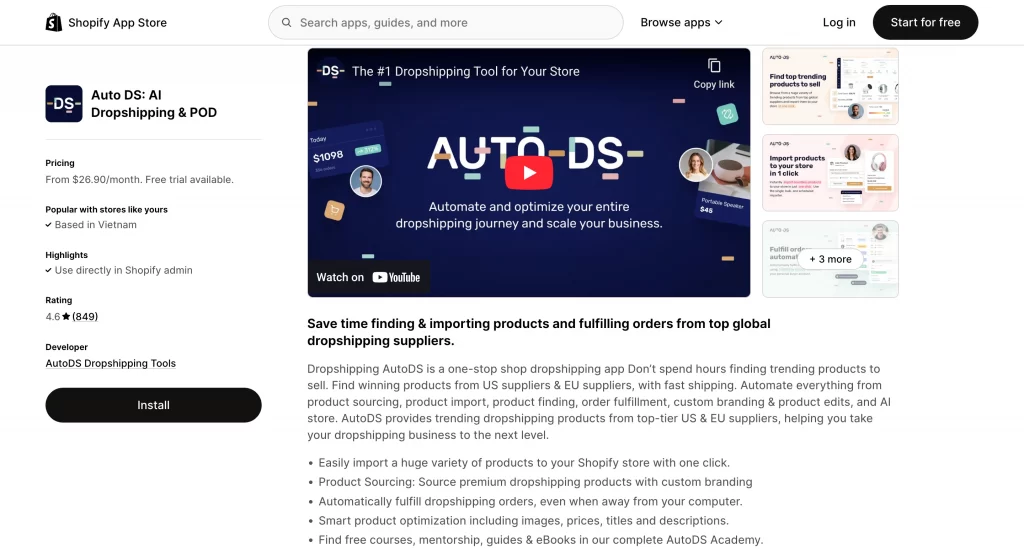
Features
- Product sourcing from major suppliers such as AliExpress, Amazon, and Walmart.
- AI-powered product research to identify trending and profitable items.
- Automatic order fulfillment and inventory synchronization.
- Dynamic pricing and stock monitoring to avoid overselling.
- Support for both dropshipping and print-on-demand products.
Pros
- Automates nearly every step of the dropshipping workflow.
- Wide supplier network offers high flexibility.
- Built-in profit and analytics dashboard for better decision-making.
- Great for scaling stores without increasing manual workload.
Cons
- Subscription cost may be high for beginners.
- Requires learning curve to set automation rules effectively.
- Some suppliers may have longer shipping times depending on source location.
Pricing
- Paid plans typically start around $12.90/month, based on order volume and automation features.
- Free trial available for new users.
4. CJdropshipping: Much Faster
CJdropshipping is a comprehensive dropshipping platform that offers product sourcing, order fulfillment, and global logistics. It integrates directly with Shopify, providing fast shipping, quality control, and private labeling options for eCommerce sellers.
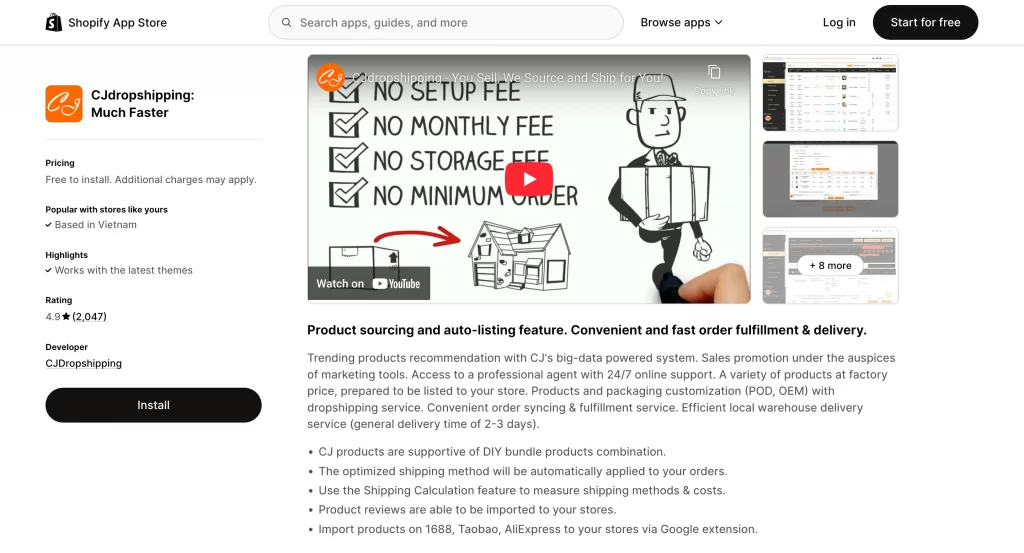
Features
- Access to millions of products across categories like fashion, home, and electronics.
- Direct sourcing from Chinese and global warehouses with fast delivery.
- Automated product import and real-time inventory sync.
- Branding options like custom packaging, inserts, and logo printing.
- 24/7 customer service and after-sales support for merchants.
Pros
- Fast global fulfillment compared to many other dropshipping platforms.
- No upfront costs — pay only when an order is made.
- Offers product photography and custom packaging for brand building.
- Integrated warehouse and logistics system for reliability.
Cons
- Interface can be overwhelming for new users.
- Shipping costs and times may vary depending on product source.
- Limited control over supplier selection compared to direct sourcing.
Pricing: Free to install and use. Merchants only pay for products and shipping costs.
Orders and shipping apps
1. BIG Digital Downloads Products
BIG Digital Downloads Products lets Shopify merchants sell and deliver digital goods instantly. It’s perfect for businesses offering eBooks, software, digital art, music, or online courses. Once a purchase is completed, customers automatically receive a secure download link or unique access key via email.
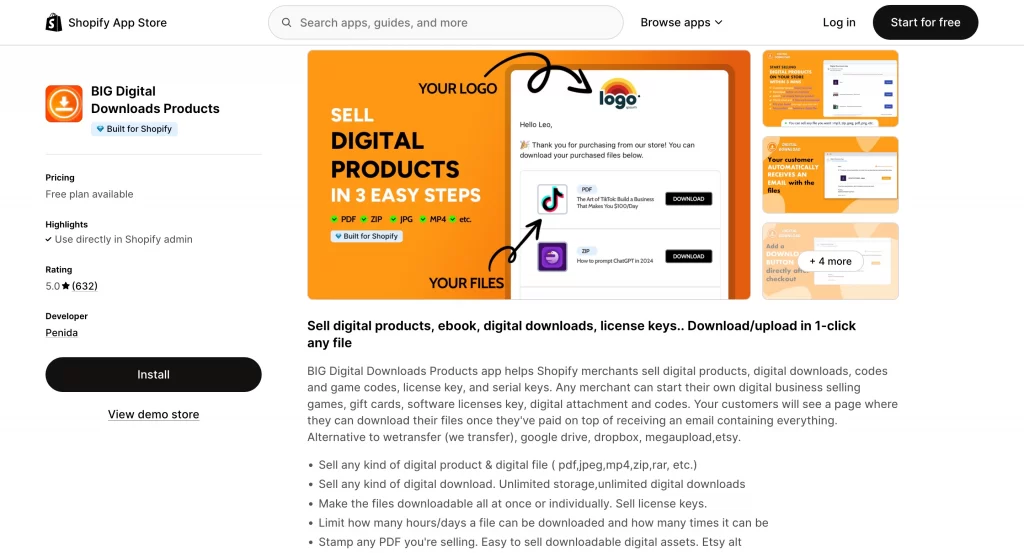
Features
- Supports multiple digital file types (PDF, ZIP, MP4, etc.) and product variants.
- Automatically delivers files or license codes after payment.
- Provides instant download links through order confirmation and email.
- Allows for unlimited digital orders depending on plan.
- Tracks downloads and ensures secure file distribution.
Pros:
- Simplifies selling digital goods with instant, automated delivery.
- Easy setup and integration with Shopify checkout.
- Reduces support requests with automatic fulfillment.
- Secure storage and download tracking for better control.
Cons:
- Only suitable for digital product businesses.
- Large files may require higher-tier plans.
- No support for physical product fulfillment.
Pricing
- Free plan available with basic storage.
- Paid plans start around $12/month and increase with storage and feature capacity.
2. Order Printer Pro: PDF Invoice
Order Printer Pro helps Shopify merchants easily print and share invoices, packing slips, and order documents. It’s ideal for stores that need professional-looking invoices or want to automatically send PDFs to customers after purchase.
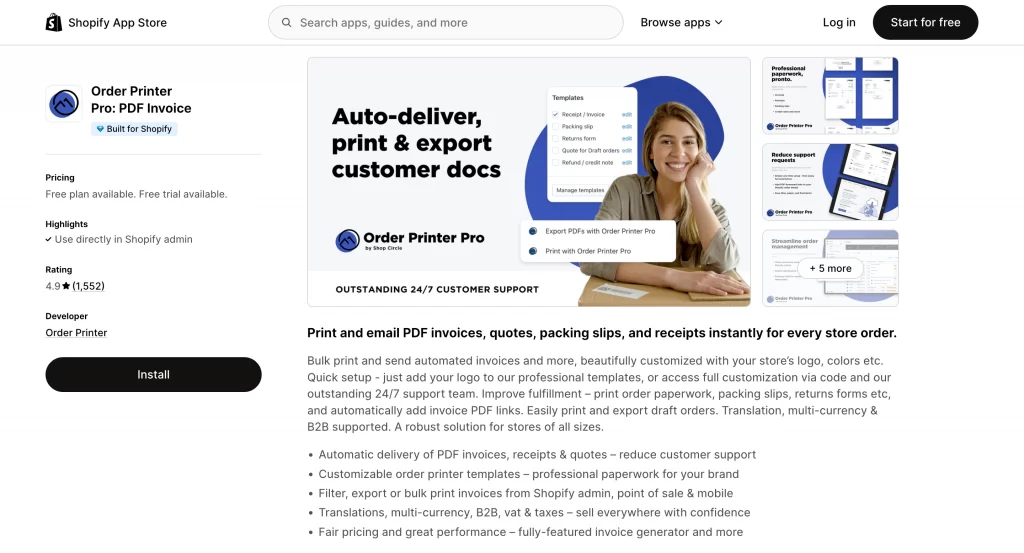
Features
- Generate invoices, receipts, and packing slips automatically.
- Email PDFs to customers after checkout or on demand.
- Fully customizable templates that match your store’s branding.
- Bulk print and download multiple orders at once.
- Supports international tax and multi-language invoices.
Pros:
- Saves time by automating invoice creation and delivery.
- Clean, professional designs suitable for global compliance.
- Simple to set up and fully compatible with Shopify.
- Helpful for both small shops and high-volume merchants.
Cons:
- Some advanced template edits require basic HTML knowledge.
- PDF customization beyond templates may take extra time.
- Free plan only covers limited documents per month.
Pricing
- Free plan available for up to a few invoices per month.
- Paid plans start around $10/month, depending on document volume.
3. Post & DHL Shipping (Official)
Post & DHL Shipping is the official Shopify integration for DHL, allowing merchants to generate labels, manage shipments, and access global DHL shipping services directly from their Shopify dashboard. It’s ideal for businesses that regularly ship internationally or need reliable delivery tracking.
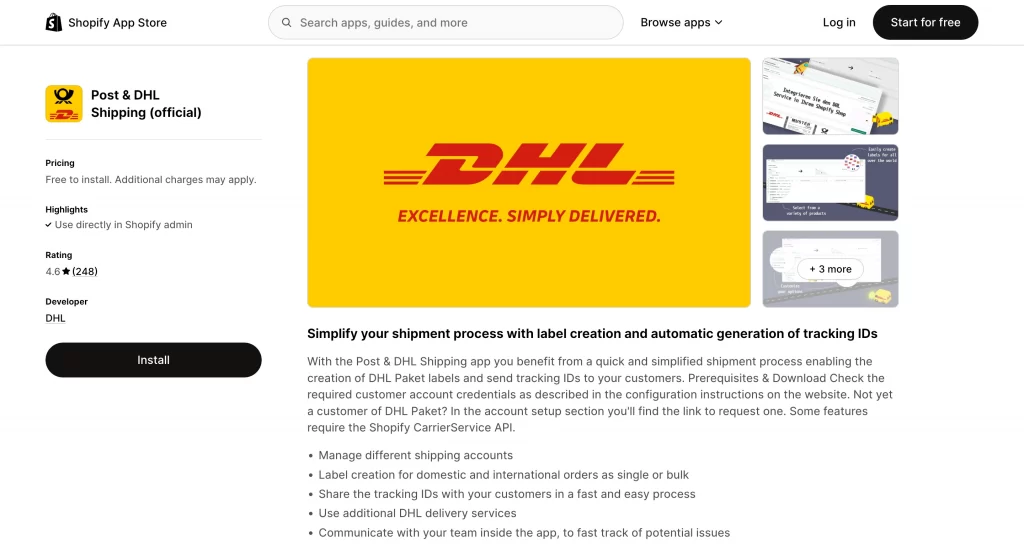
Features
- Automatically generate and print DHL shipping labels.
- Access discounted DHL rates for domestic and international shipping.
- Real-time tracking updates for both merchants and customers.
- Supports return labels and multi-package shipments.
- Syncs shipping information automatically with Shopify orders.
Pros:
- Official DHL integration ensures reliability and accurate data.
- Simplifies international shipping with pre-filled customs forms.
- Offers real-time shipment tracking and updates.
- Saves time with automatic label generation.
Cons:
- Limited to DHL services; no multi-carrier options.
- Requires a registered DHL account to access rates.
- May have regional restrictions based on supported countries.
Pricing: Free to install. Merchants pay for DHL shipping labels at negotiated or published rates.
4. Order Printer Templates
Order Printer Templates allows Shopify merchants to create custom invoice, receipt, and packing slip templates without coding. It’s a companion tool for Shopify’s free Order Printer app, offering pre-designed layouts that can be easily personalized.
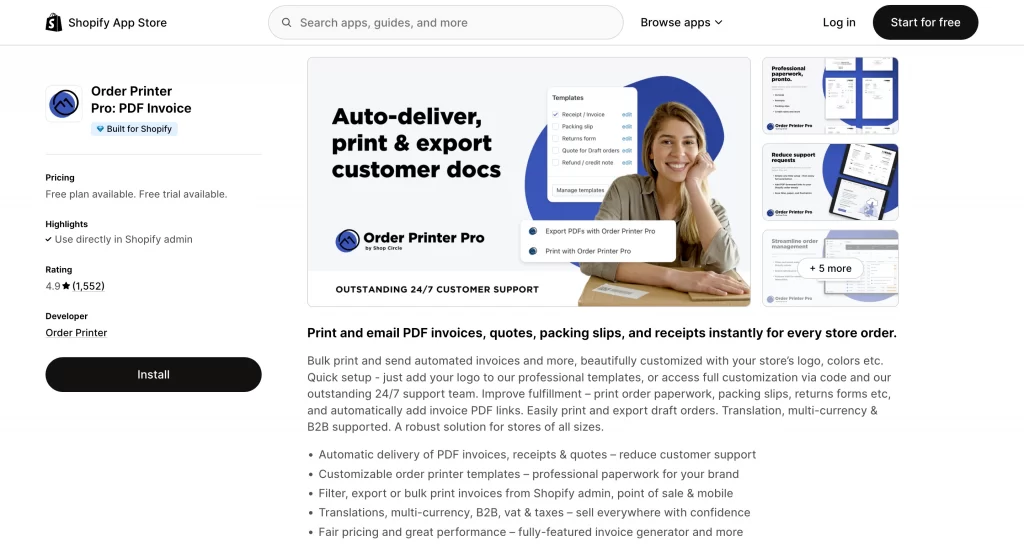
Features
- Professionally designed templates for invoices, receipts, and packing slips.
- Customizable with store logo, colors, and business details.
- One-time purchase templates (no monthly subscription required).
- Compatible with Order Printer and Order Printer Pro apps.
- Supports multiple languages and currencies for international stores.
Pros:
- Creates polished, branded order documents instantly.
- No ongoing costs — templates are a one-time purchase.
- Great for businesses wanting consistent, professional invoices.
- Integrates smoothly with Shopify’s printing tools.
Cons:
- Does not generate invoices automatically (requires Order Printer app).
- Limited editing flexibility beyond provided template structure.
- One-time template purchases are per design type (invoice, packing slip, etc.).
Pricing
- Free to install.
- Templates are sold individually, typically at a one-time fee of around $29 per template.
Marketing and conversion apps
1. Mailchimp Email SMS Marketing
Mailchimp Email SMS Marketing helps Shopify merchants connect with customers through automated emails, SMS campaigns, and personalized marketing journeys. It integrates seamlessly with Shopify, allowing you to sync customer, order, and product data for targeted communication that drives repeat sales and brand loyalty.
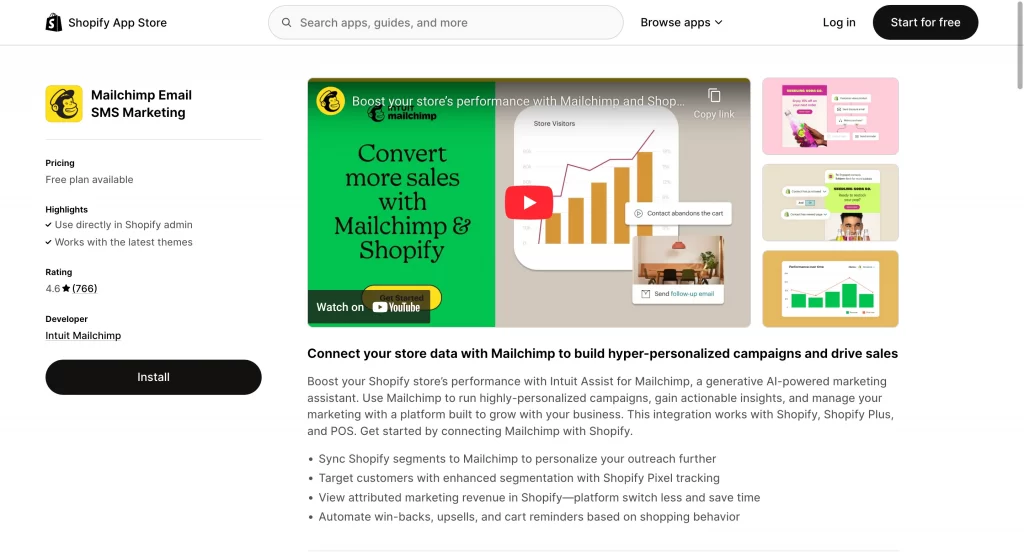
Features
- Email and SMS automation for welcome, abandoned cart, and post-purchase campaigns.
- Audience segmentation based on customer behavior and purchase history.
- Drag-and-drop email builder with professional templates.
- Real-time analytics for open rates, clicks, and conversions.
- Integrates with Shopify to sync customer data and product recommendations.
Pros
- Combines email and SMS in one powerful platform.
- Highly customizable automation flows for any sales funnel.
- Excellent analytics and deliverability rates.
- Strong brand reputation and extensive third-party integrations.
Cons
- Pricing increases as contact lists grow.
- Some advanced automation requires setup time.
- SMS messaging incurs additional fees based on usage.
Pricing
- Free plan available with limited contacts and email sends.
- Paid plans start around $13/month and scale with audience size and advanced features.
2. Judge.me Product Reviews App
Judge.me helps Shopify merchants collect and display customer reviews and ratings to build trust and increase conversions. It offers automatic review request emails, photo and video reviews, and customizable widgets to showcase social proof across your store.
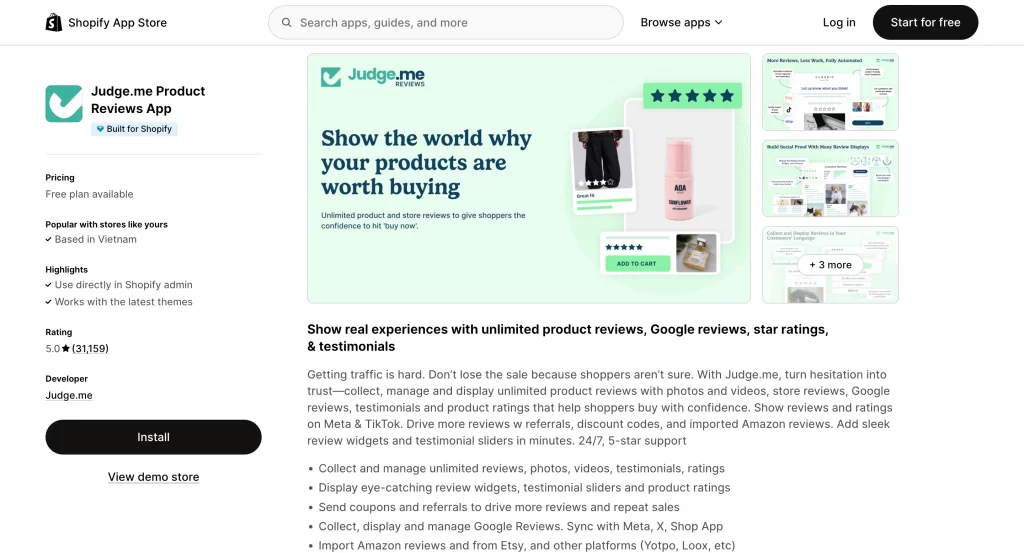
Features
- Collect text, photo, and video reviews through automated email requests.
- Display star ratings and reviews on product and collection pages.
- Showcase widgets such as “Carousel” or “All Reviews” for better visibility.
- Import and export reviews from other platforms easily.
- SEO-friendly structured data for Google Rich Snippets.
Pros:
- Affordable and feature-rich, even on the free plan.
- Builds credibility and boosts customer trust through authentic reviews.
- Highly customizable design and multi-language support.
- Excellent customer service and setup guidance.
Cons:
- Free version includes “Powered by Judge.me” branding.
- Limited advanced analytics compared to premium review tools.
- Some customization options require basic technical know-how.
Pricing
- Free Forever plan with essential features.
- Paid plan (Awesome) costs $15/month for advanced customization and additional widgets.
3. Google & YouTube
The Google & YouTube app connects your Shopify store to Google Merchant Center, allowing you to promote products across Google Search, Shopping, YouTube, and Display ads. It helps merchants reach new audiences and track performance directly from the Shopify dashboard.
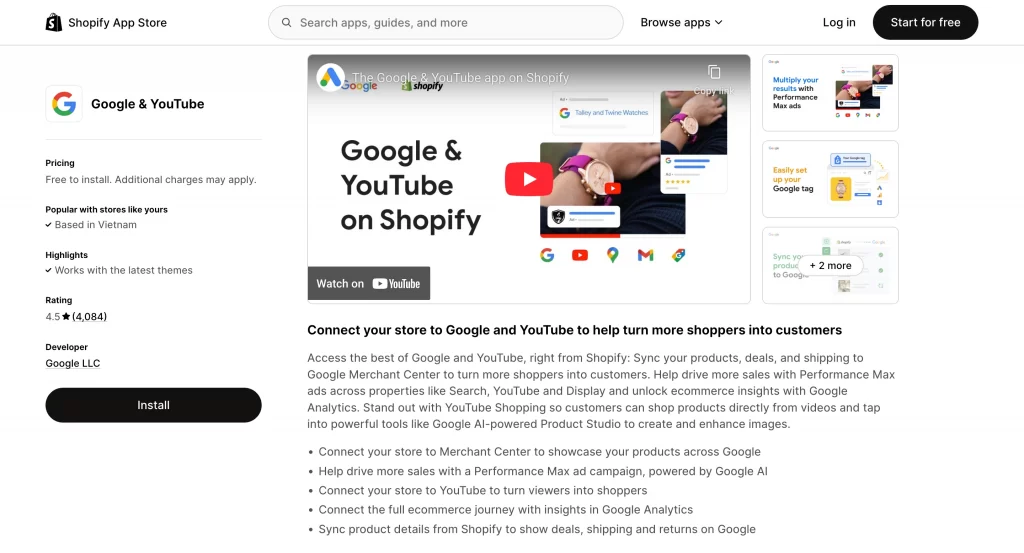
Features
- Syncs your Shopify product catalog automatically to Google Merchant Center.
- Runs Performance Max campaigns across Google channels.
- Tracks sales and conversions using Google Ads integration.
- Supports free product listings on Google Shopping.
- Real-time analytics for ad performance and impressions.
Pros:
- Simplifies advertising setup and tracking for Shopify users.
- Access to Google’s vast advertising network.
- Enables free listings for added visibility.
- Integrates easily with Google Ads and Analytics.
Cons:
- Ad success depends on campaign optimization and budget.
- Requires Google account setup and verification.
- Limited creative control for automated campaigns.
Pricing: Free to install. Merchants pay directly to Google for ads based on their campaign budget.
4. Shopify Collabs
Shopify Collabs is an influencer and affiliate management platform designed to connect brands with creators. It helps merchants grow their business through influencer partnerships, affiliate programs, and social collaborations, all managed within Shopify.
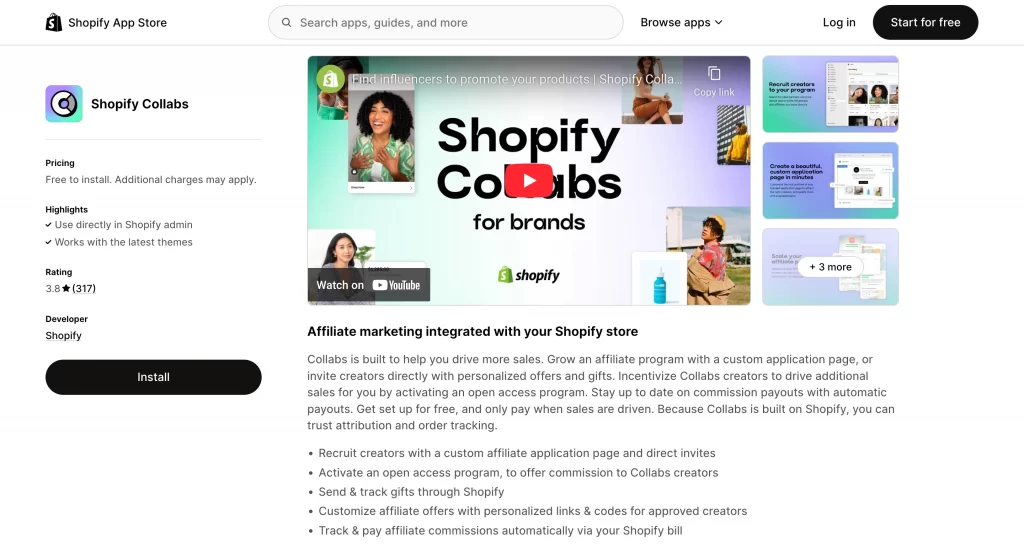
Features
- Discover and invite creators from the Shopify Collabs network.
- Manage affiliate links, discount codes, and commissions in one dashboard.
- Track creator performance with real-time sales and engagement data.
- Automate influencer payouts and communication.
- Integrates seamlessly with Shopify checkout for accurate tracking.
Pros:
- Great for influencer marketing and brand awareness.
- Streamlines affiliate and collaboration management.
- Built-in reporting helps measure ROI and identify top performers.
- 100% integrated with Shopify — no need for third-party tools.
Cons:
- Limited creator discovery options compared to dedicated influencer platforms.
- Success depends on the quality of partnerships you build.
- Newer app — some features may still be evolving.
Pricing: Free to install and use. Shopify does not charge additional fees for Collabs; merchants only pay affiliate commissions to creators.
Shopify Integrations: FAQs
- What are Shopify integrations?
Shopify integrations are syncing your Shopify store with other plugins/apps to optimize and boost your business. Each plugin/app has its own functions. Therefore, depending on your demand, you can choose the appropriate plugins/apps.
- What are the most useful Shopify integrations apps?
Shopify allows the integration of hundreds of plugins/apps to boost your sales. Here are the top 7 plugins/apps to drive sales for your Shopify store.
#1. Yotpo
#2. Privy
#3. Printful
#4. Now Back in Stock
#5. Bold Sales Motivator
#6. LitCommerce
#7. Shopsync - Does Shopify allow integrating with Amazon?
Yes, you can totally integrate Shopify with Amazon in different ways. Please click here to read the details of two basic ways to integrate Shopify and Amazon.
How to Sell Amazon Products on Shopify? A 4-step Guide for Sellers
Conclusion: Use Shopify Integrations to Level Up Your Business
Much to its credit, selling on Shopify – one of the best selling platforms – is straightforward to set up and utilize. But Shopify is from the ground up to modular. It allows you to “plug and play” new features to modify your store, shopping experience, and advertising campaigns.
You don’t have to install all of these apps but it’s highly advisable to try out some of their capabilities. These Shopify integrations help you improve your marketing effectiveness and list products on the world’s major marketplaces.
Many of these services offer free trials. Take a chance and see if they can help you enhance your online business.
If you currently own an online store and want to expand your business and sell on a top global marketplace, LitCommerce can be your best decision. Integrating your store with Amazon, eBay, Etsy,.. and managing all your data and sync inventory from a single dashboard. LitCommerce also has a 24/7 customer support team that can assist you at any time. Furthermore, there’s a Facebook Community where you can join and get the best eCommerce tips and news.
Enjoy reading with our LitCommerce Retailer Blog!

